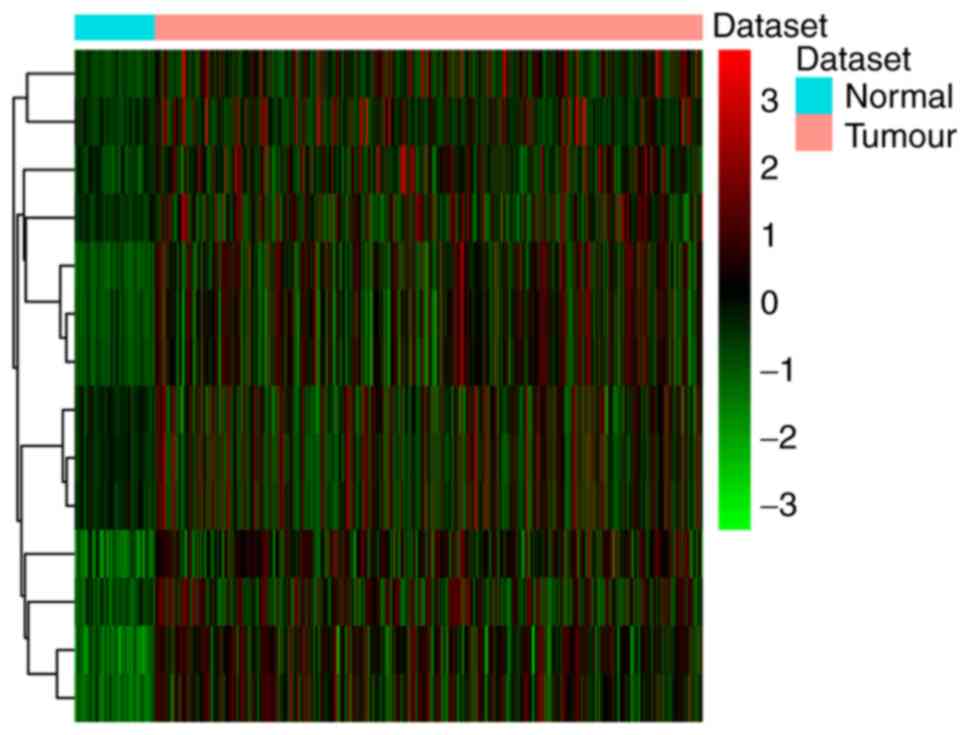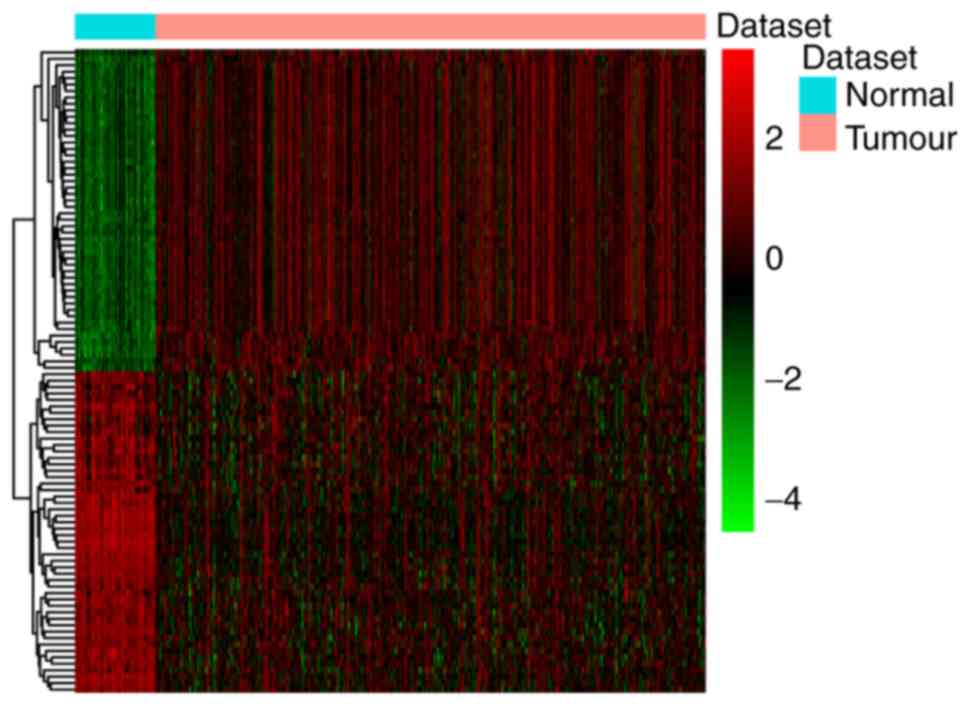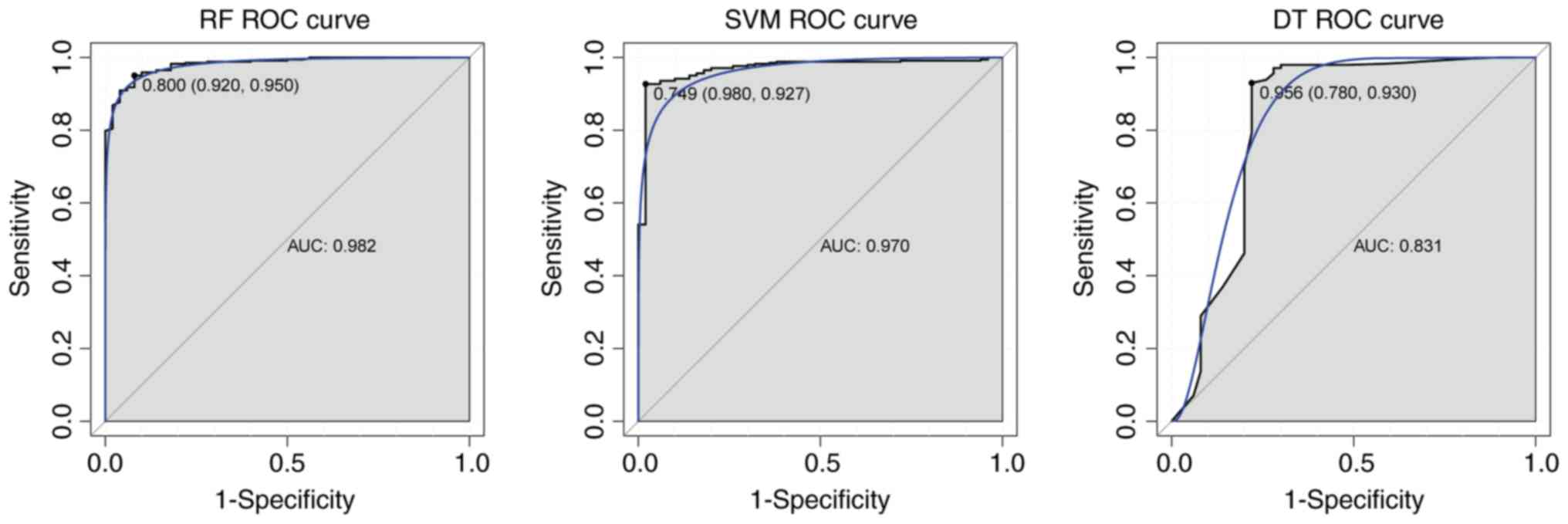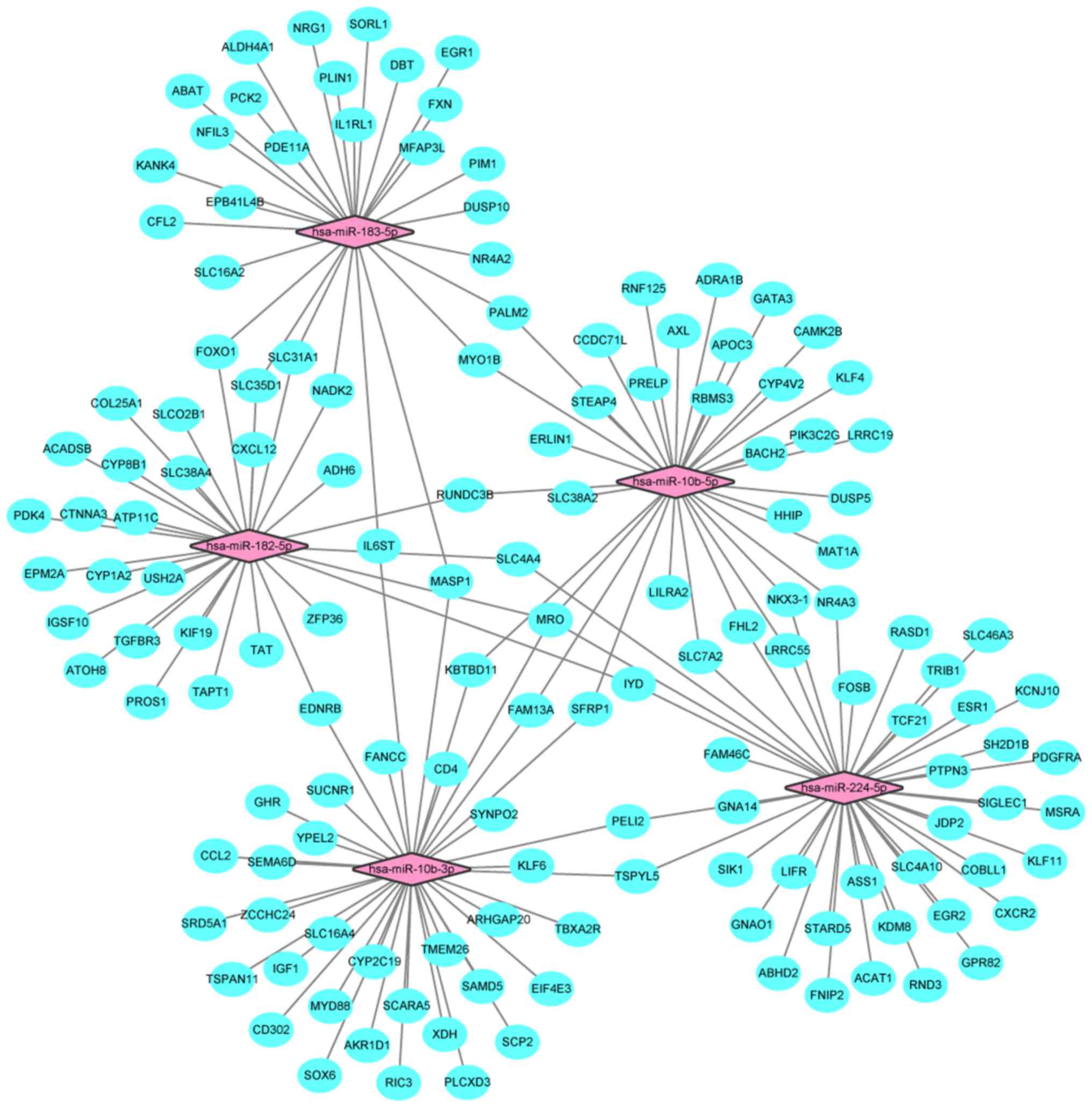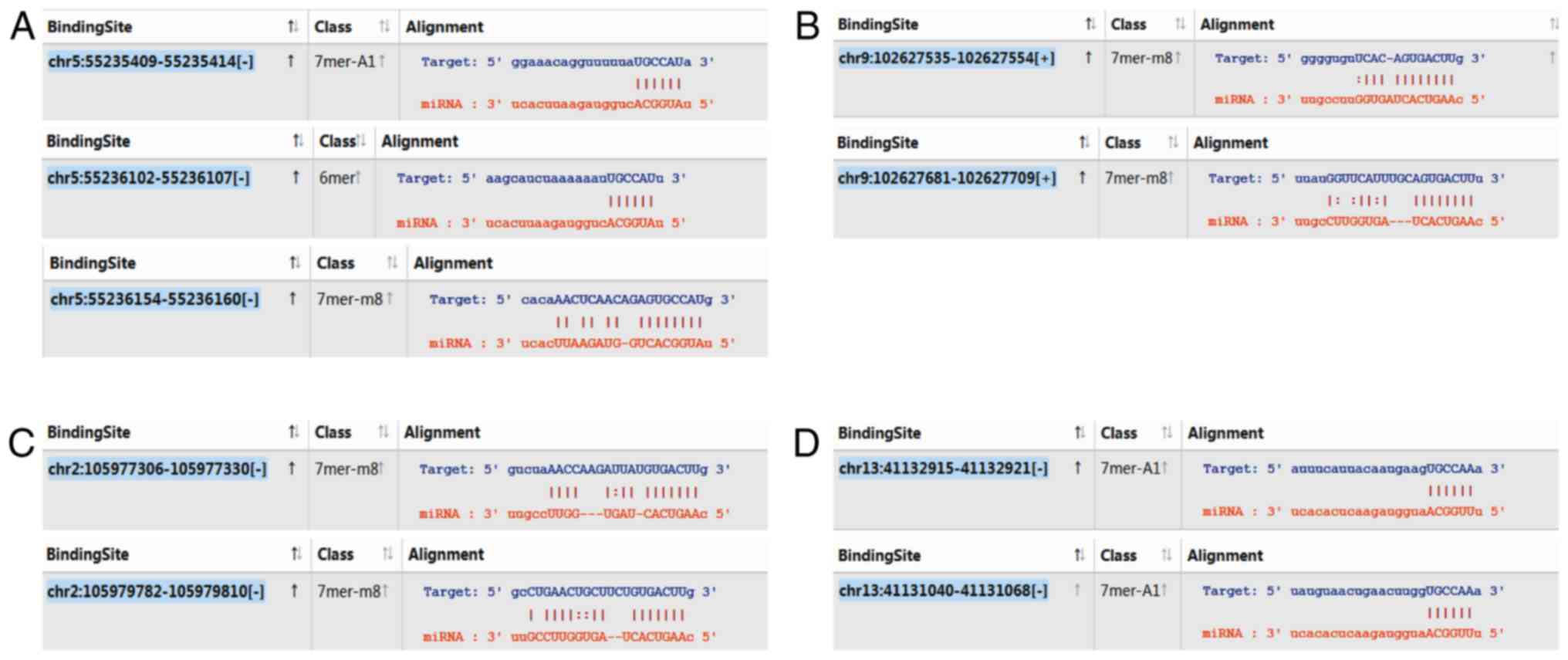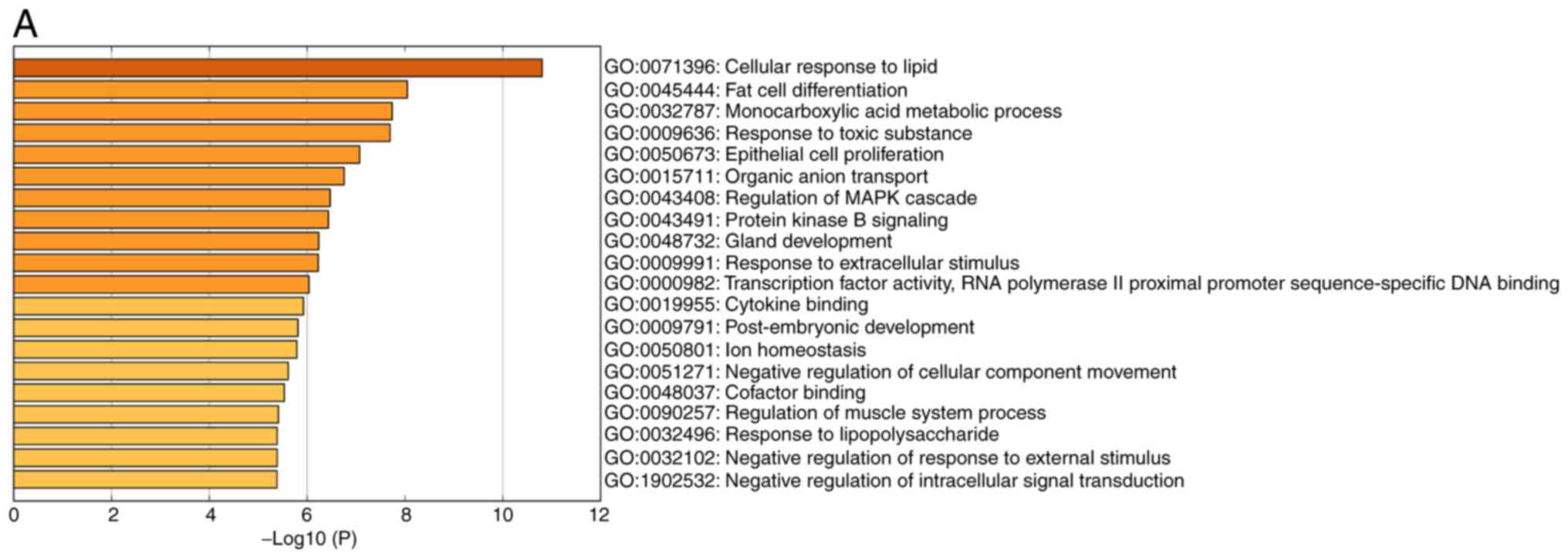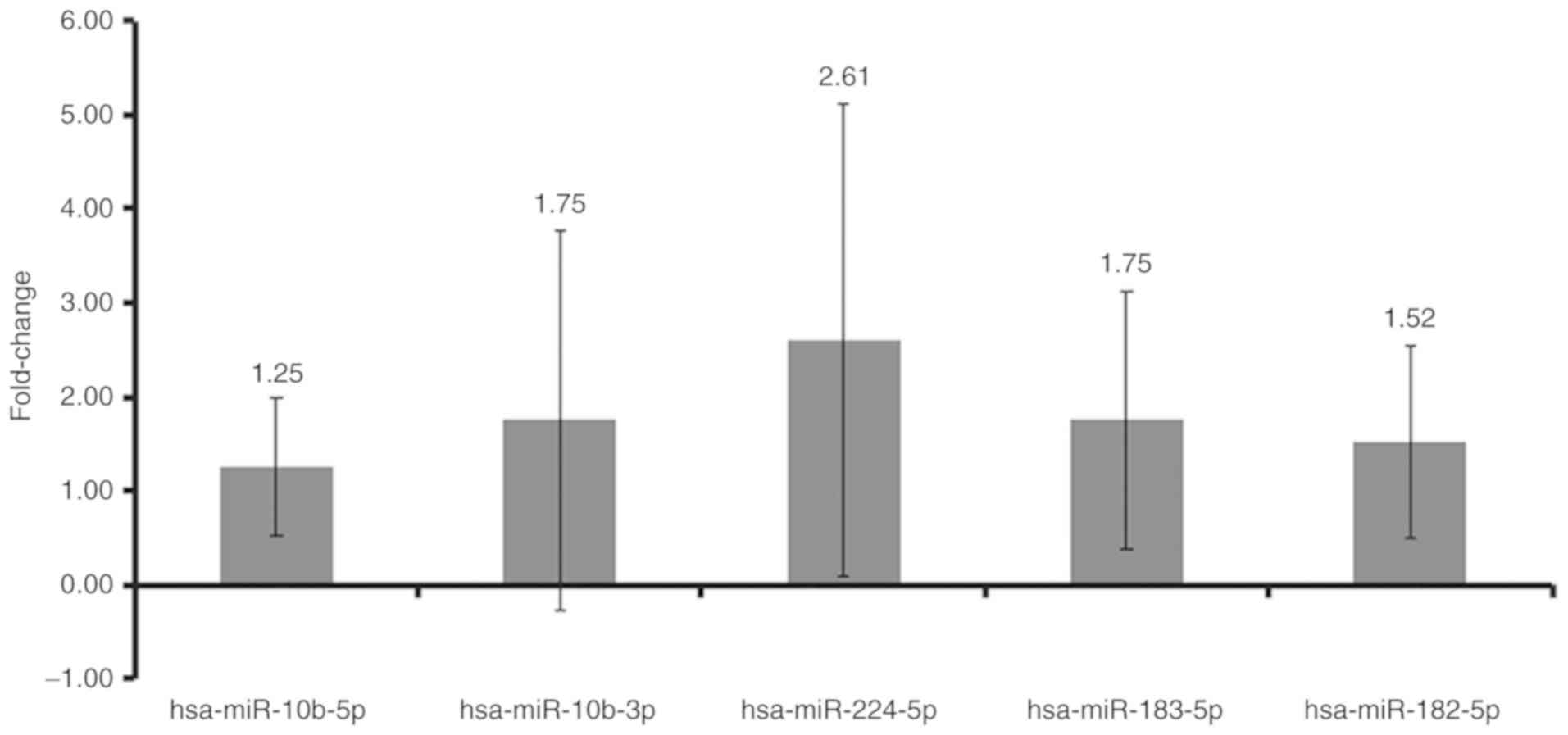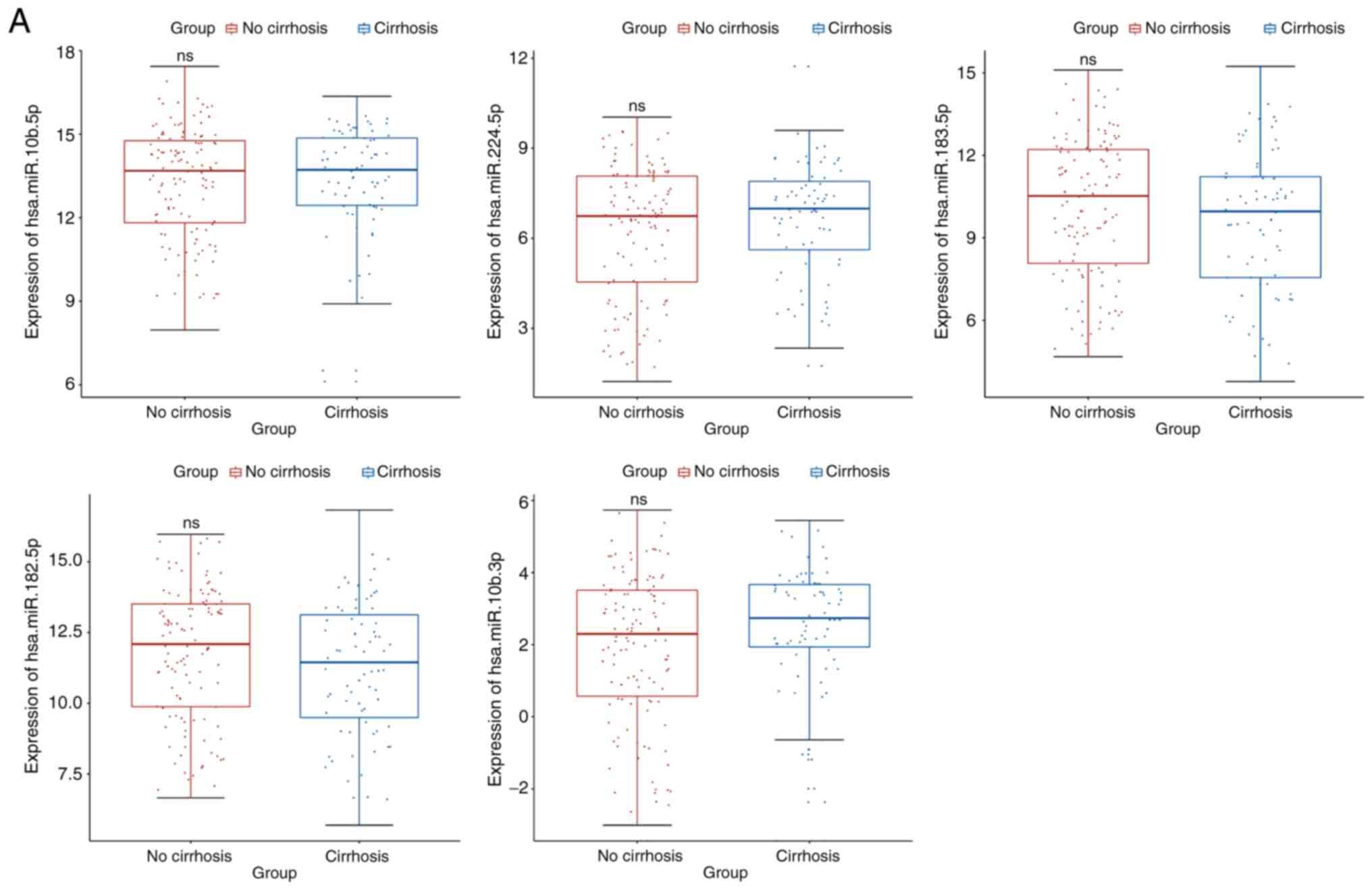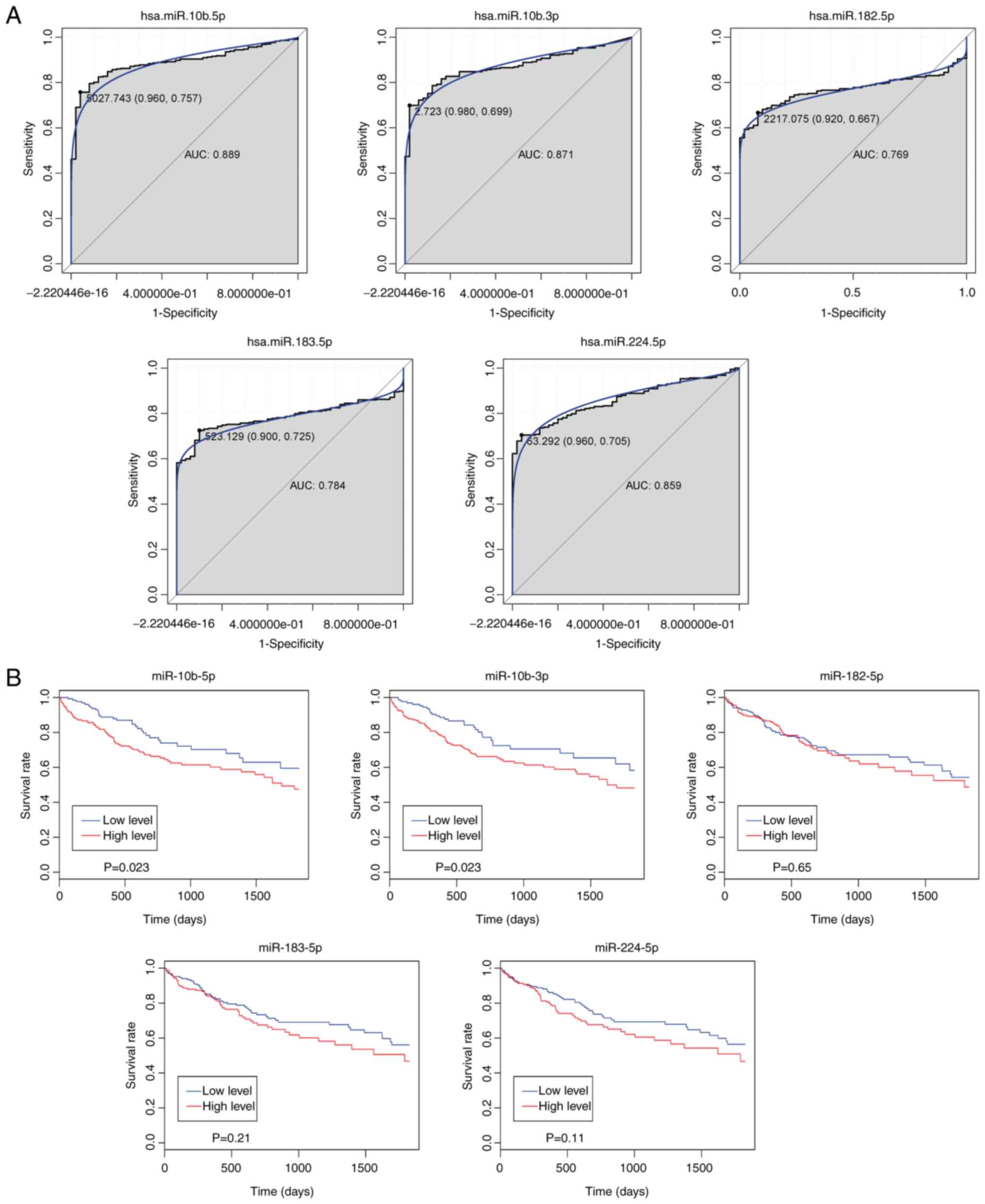|
1
|
Torre LA, Bray F, Siegel RL, Ferlay J,
Lortet-Tieulent J and Jemal A: Global cancer statistics, 2012. CA
Cancer J Clin. 65:87–108. 2015. View Article : Google Scholar : PubMed/NCBI
|
|
2
|
Critelli RM, De Maria N and Villa E:
Biology of hepatocellular carcinoma. Dig Dis. 33:635–641. 2015.
View Article : Google Scholar : PubMed/NCBI
|
|
3
|
Forner A, Llovet JM and Bruix J:
Hepatocellular carcinoma. Lancet. 379:1245–1255. 2012. View Article : Google Scholar : PubMed/NCBI
|
|
4
|
Fattovich G, Stroffolini T, Zagni I and
Donato F: Hepatocellular carcinoma in cirrhosis: Incidence and risk
factors. Gastroenterology. 127 (5 Suppl 1):S35–S50. 2004.
View Article : Google Scholar : PubMed/NCBI
|
|
5
|
Kumagi T, Hiasa Y and Hirschfield GM:
Hepatocellular carcinoma for the non-specialist. BMJ.
339:b50392009. View Article : Google Scholar : PubMed/NCBI
|
|
6
|
Tanaka M, Katayama F, Kato H, Tanaka H,
Wang J, Qiao YL and Inoue M: Hepatitis B and C virus infection and
hepatocellular carcinoma in China: A review of epidemiology and
control measures. J Epidemiol. 21:401–416. 2011. View Article : Google Scholar : PubMed/NCBI
|
|
7
|
El-Serag HB and Rudolph KL: Hepatocellular
carcinoma: Epidemiology and molecular carcinogenesis.
Gastroenterology. 132:2557–2576. 2007. View Article : Google Scholar : PubMed/NCBI
|
|
8
|
Llovet JM, Zucman-Rossi J, Pikarsky E,
Sangro B, Schwartz M, Sherman M and Gores G: Hepatocellular
carcinoma. Nat Rev Dis Primer. 2:160182016. View Article : Google Scholar
|
|
9
|
Nishida N, Nagasaka T, Nishimura T, Ikai
I, Boland CR and Goel A: Aberrant methylation of multiple tumor
suppressor genes in aging liver, chronic hepatitis, and
hepatocellular carcinoma. Hepatology. 47:908–918. 2008. View Article : Google Scholar : PubMed/NCBI
|
|
10
|
Lehmann U, Wingen LU, Brakensiek K,
Wedemeyer H, Becker T, Heim A, Metzig K, Hasemeier B, Kreipe H and
Flemming P: Epigenetic defects of hepatocellular carcinoma are
already found in non-neoplastic liver cells from patients with
hereditary haemochromatosis. Hum Mol Genet. 16:1335–1342. 2007.
View Article : Google Scholar : PubMed/NCBI
|
|
11
|
Li B, Liu W, Wang L, Li M, Wang J, Huang
L, Huang P and Yuan Y: CpG island methylator phenotype associated
with tumor recurrence in tumor-node-metastasis stage I
hepatocellular carcinoma. Ann Surg Oncol. 17:1917–1926. 2010.
View Article : Google Scholar : PubMed/NCBI
|
|
12
|
Liu H, Wang X, Feng B, Tang L, Li W, Zheng
X, Liu Y, Peng Y, Zheng G and He Q: Golgi phosphoprotein 3 (GOLPH3)
promotes hepatocellular carcinoma progression by activating mTOR
signaling pathway. BMC Cancer. 18:6612018. View Article : Google Scholar : PubMed/NCBI
|
|
13
|
Roxburgh P and Evans TR: Systemic therapy
of hepatocellular carcinoma: Are we making progress? Adv Ther.
25:1089–1104. 2008. View Article : Google Scholar : PubMed/NCBI
|
|
14
|
Chen H, Zhang T, Sheng Y and Zhang C, Peng
Y, Wang X and Zhang C: Methylation profiling of multiple tumor
suppressor genes in hepatocellular carcinoma and the epigenetic
mechanism of 3OST2 regulation. J Cancer. 6:740–749. 2015.
View Article : Google Scholar : PubMed/NCBI
|
|
15
|
Plasterk RH: Micro RNAs in animal
development. Cell. 124:877–881. 2006. View Article : Google Scholar : PubMed/NCBI
|
|
16
|
Tang W, Tang J, He J, Zhou Z, Qin Y, Qin
J, Li B, Xu X, Geng Q, Jiang W, et al:
SLIT2/ROBO1-miR-218-1-RET/PLAG1: A new disease pathway involved in
hirschsprung's disease. J Cell Mol Med. 19:1197–1207. 2015.
View Article : Google Scholar : PubMed/NCBI
|
|
17
|
Xu J, Wu C, Che X, Wang L, Yu D, Zhang T,
Huang L, Li H, Tan W, Wang C and Lin D: Circulating microRNAs,
miR-21, miR-122, and miR-223, in patients with hepatocellular
carcinoma or chronic hepatitis. Mol Carcinog. 50:136–142. 2011.
View Article : Google Scholar : PubMed/NCBI
|
|
18
|
Tomimaru Y, Eguchi H, Nagano H, Wada H,
Kobayashi S, Marubashi S, Tanemura M, Tomokuni A, Takemasa I,
Umeshita K, et al: Circulating microRNA-21 as a novel biomarker for
hepatocellular carcinoma. J Hepatol. 56:167–175. 2012. View Article : Google Scholar : PubMed/NCBI
|
|
19
|
Zhang J, Yang Y, Yang T, Liu Y, Li A, Fu
S, Wu M, Pan Z and Zhou W: MicroRNA-22, downregulated in
hepatocellular carcinoma and correlated with prognosis, suppresses
cell proliferation and tumourigenicity. Br J Cancer. 103:1215–1220.
2010. View Article : Google Scholar : PubMed/NCBI
|
|
20
|
Huang J, Wang Y, Guo Y and Sun S:
Down-regulated microRNA-152 induces aberrant DNA methylation in
hepatitis B virus-related hepatocellular carcinoma by targeting DNA
methyltransferase 1. Hepatology. 52:60–70. 2010. View Article : Google Scholar : PubMed/NCBI
|
|
21
|
Gramantieri L, Ferracin M, Fornari F,
Veronese A, Sabbioni S, Liu CG, Calin GA, Giovannini C, Ferrazzi E,
Grazi GL, et al: Cyclin G1 is a target of miR-122a, a microRNA
frequently down-regulated in human hepatocellular carcinoma. Cancer
Res. 67:6092–6099. 2007. View Article : Google Scholar : PubMed/NCBI
|
|
22
|
Callegari E, Gramantieri L, Domenicali M,
D'Abundo L, Sabbioni S and Negrini M: MicroRNAs in liver cancer: A
model for investigating pathogenesis and novel therapeutic
approaches. Cell Death Differ. 22:46–57. 2015. View Article : Google Scholar : PubMed/NCBI
|
|
23
|
Anders S and Huber W: Differential
expression analysis for sequence count data. Genome Biol.
11:R1062010. View Article : Google Scholar : PubMed/NCBI
|
|
24
|
Benjamini Y and Hochberg Y: Controlling
the false discovery rate: A practical and powerful approach to
multiple testing. J R Stat Soc B. 57:289–300. 1995.
|
|
25
|
Smoot ME, Ono K, Ruscheinski J, Wang PL
and Ideker T: Cytoscape 2.8: New features for data integration and
network visualization. Bioinformatics. 27:431–432. 2011. View Article : Google Scholar : PubMed/NCBI
|
|
26
|
Wojcicka A, Swierniak M, Kornasiewicz O,
Gierlikowski W, Maciag M, Kolanowska M, Kotlarek M, Gornicka B,
Koperski L, Niewinski G, et al: Next generation sequencing reveals
microRNA isoforms in liver cirrhosis and hepatocellular carcinoma.
Int J Biochem Cell Biol. 53:208–217. 2014. View Article : Google Scholar : PubMed/NCBI
|
|
27
|
Livak KJ and Schmittgen TD: Analysis of
relative gene expression data using real-time quantitative PCR and
the 2(-Delta Delta C(T)) method. Methods. 25:402–408. 2001.
View Article : Google Scholar : PubMed/NCBI
|
|
28
|
Huss S, Stellmacher C, Goltz D,
Khlistunova I, Adam AC, Trebicka J, Kirfel J, Büttner R and
Weiskirchen R: Deficiency in four and one half LIM domain protein 2
(FHL2) aggravates liver fibrosis in mice. BMC Gastroenterol.
13:82013. View Article : Google Scholar : PubMed/NCBI
|
|
29
|
Coppola N, Onorato L, Panella M, de
Stefano G, Mosca N, Minichini C, Messina V, Potenza N, Starace M,
Alessio L, et al: Correlation between the hepatic expression of
human MicroRNA hsa-miR-125a-5p and the progression of fibrosis in
patients with overt and occult HBV infection. Front Immunol.
9:13342018. View Article : Google Scholar : PubMed/NCBI
|
|
30
|
Wei JX, Lv LH, Wan YL, Cao Y, Li GL, Lin
HM, Zhou R, Shang CZ, Cao J, He H, et al: Vps4A functions as a
tumor suppressor by regulating the secretion and uptake of exosomal
microRNAs in human hepatoma cells. Hepatology. 61:1284–1294. 2015.
View Article : Google Scholar : PubMed/NCBI
|
|
31
|
Li QJ, Zhou L, Yang F, Wang GX, Zheng H,
Wang DS, He Y and Dou KF: MicroRNA-10b promotes migration and
invasion through CADM1 in human hepatocellular carcinoma cells.
Tumour Biol. 33:1455–1465. 2012. View Article : Google Scholar : PubMed/NCBI
|
|
32
|
Finch PW, He X, Kelley MJ, Uren A,
Schaudies RP, Popescu NC, Rudikoff S, Aaronson SA, Varmus HE and
Rubin JS: Purification and molecular cloning of a secreted,
Frizzled-related antagonist of Wnt action. Proc Natl Acad Sci USA.
94:6770–6775. 1997. View Article : Google Scholar : PubMed/NCBI
|
|
33
|
Kaur P, Mani S, Cros MP, Scoazec JY,
Chemin I, Hainaut P and Herceg Z: Epigenetic silencing of sFRP1
activates the canonical Wnt pathway and contributes to increased
cell growth and proliferation in hepatocellular carcinoma. Tumour
Biol. 33:325–336. 2012. View Article : Google Scholar : PubMed/NCBI
|
|
34
|
Huang ZH, Hu Y, Hua D, Wu YY, Song MX and
Cheng ZH: Quantitative analysis of multiple methylated genes in
plasma for the diagnosis and prognosis of hepatocellular carcinoma.
Exp Mol Pathol. 91:702–707. 2011. View Article : Google Scholar : PubMed/NCBI
|
|
35
|
Yang C, Zheng S, Liu T, Liu Q, Dai F, Zhou
J, Chen Y, Sheyhidin I and Lu X: Down-regulated miR-26a promotes
proliferation, migration, and invasion via negative regulation of
MTDH in esophageal squamous cell carcinoma. FASEB J. 31:2114–2122.
2017. View Article : Google Scholar : PubMed/NCBI
|
|
36
|
Guan L, Ji D, Liang N, Li S and Sun B:
Up-regulation of miR-10b-3p promotes the progression of
hepatocellular carcinoma cells via targeting CMTM5. J Cell Mol Med.
22:3434–3441. 2018. View Article : Google Scholar : PubMed/NCBI
|
|
37
|
Salomonis N, Dexheimer PJ, Omberg L,
Schroll R, Bush S, Huo J, Schriml L, Ho Sui S, Keddache M, Mayhew
C, et al: Integrated genomic analysis of diverse induced
pluripotent stem cells from the progenitor cell biology consortium.
Stem Cell Reports. 7:110–125. 2016. View Article : Google Scholar : PubMed/NCBI
|
|
38
|
Mok SR, Mohan S, Grewal N, Elfant AB and
Judge TA: A genetic database can be utilized to identify potential
biomarkers for biphenotypic hepatocellular
carcinoma-cholangiocarcinoma. J Gastrointest Oncol. 7:570–579.
2016. View Article : Google Scholar : PubMed/NCBI
|
|
39
|
Shi KQ, Lin Z, Chen XJ, Song M, Wang YQ,
Cai YJ, Yang NB, Zheng MH, Dong JZ, Zhang L and Chen YP:
Hepatocellular carcinoma associated microRNA expression signature:
Integrated bioinformatics analysis, experimental validation and
clinical significance. Oncotarget. 6:25093–25108. 2015. View Article : Google Scholar : PubMed/NCBI
|
|
40
|
Shen J, Wang A, Wang Q, Gurvich I, Siegel
AB, Remotti H and Santella RM: Exploration of genome-wide
circulating microRNA in hepatocellular carcinoma: MiR-483-5p as a
potential biomarker. Cancer Epidemiol Biomarkers Prev.
22:2364–2373. 2013. View Article : Google Scholar : PubMed/NCBI
|
|
41
|
Hung CH, Hu TH, Lu SN, Kuo FY, Chen CH,
Wang JH, Huang CM, Lee CM, Lin CY, Yen YH and Chiu YC: Circulating
microRNAs as biomarkers for diagnosis of early hepatocellular
carcinoma associated with hepatitis B virus. Int J Cancer.
138:714–720. 2016. View Article : Google Scholar : PubMed/NCBI
|
|
42
|
Liu M, Liu J, Wang L, Wu H, Zhou C, Zhu H,
Xu N and Xie Y: Association of serum microRNA expression in
hepatocellular carcinomas treated with transarterial
chemoembolization and patient survival. Plos One. 9:e1093472014.
View Article : Google Scholar : PubMed/NCBI
|
|
43
|
Chen CY, Chung IH, Tsai MM, Tseng YH, Chi
HC, Tsai CY, Lin YH, Wang YC, Chen CP, Wu TI, et al: Thyroid
hormone enhanced human hepatoma cell motility involves
brain-specific serine protease 4 activation via ERK signaling. Mol
Cancer. 13:1622014. View Article : Google Scholar : PubMed/NCBI
|
|
44
|
Wei L, Lian B, Zhang Y, Li W, Gu J, He X
and Xie L: Application of microRNA and mRNA expression profiling on
prognostic biomarker discovery for hepatocellular carcinoma. BMC
Genomics. 15 (Suppl 1):S132014. View Article : Google Scholar : PubMed/NCBI
|
|
45
|
Lee YH, Andersen JB, Song HT, Judge AD,
Seo D, Ishikawa T, Marquardt JU, Kitade M, Durkin ME, Raggi C, et
al: Definition of ubiquitination modulator COP1 as a novel
therapeutic target in human hepatocellular carcinoma. Cancer Res.
70:8264–8269. 2010. View Article : Google Scholar : PubMed/NCBI
|
|
46
|
Liao CJ, Chi HC, Tsai CY, Chen CD, Wu SM,
Tseng YH, Lin YH, Chung IH, Chen CY, Lin SL, et al: A novel
small-form NEDD4 regulates cell invasiveness and apoptosis to
promote tumor metastasis. Oncotarget. 6:9341–9354. 2015. View Article : Google Scholar : PubMed/NCBI
|
|
47
|
Xu J, Zhou J, Li MS, Ng CF, Ng YK, Lai PB
and Tsui SK: Transcriptional regulation of the tumor suppressor
FHL2 by p53 in human kidney and liver cells. PLoS One.
9:e993592014. View Article : Google Scholar : PubMed/NCBI
|
|
48
|
Martin-Mateos R, De Assuncao TM, Arab JP,
Jalan-Sakrikar N, Yaqoob U, Greuter T, Verma VK, Mathison AJ, Cao
S, Lomberk G, et al: Enhancer of zeste homologue 2 inhibition
attenuates TGF-β dependent hepatic stellate cell activation and
liver fibrosis. Cell Mol Gastroenterol Hepatol. 7:197–209. 2019.
View Article : Google Scholar : PubMed/NCBI
|
|
49
|
Sang L, Wang XM, Xu DY and Zhao WJ:
Bioinformatics analysis of aberrantly methylated-differentially
expressed genes and pathways in hepatocellular carcinoma. World J
Gastroenterol. 24:2605–2616. 2018. View Article : Google Scholar : PubMed/NCBI
|
|
50
|
Honda M, Yamashita T, Yamashita T, Arai K,
Sakai Y, Sakai A, Nakamura M, Mizukoshi E and Kaneko S: Peretinoin,
an acyclic retinoid, improves the hepatic gene signature of chronic
hepatitis C following curative therapy of hepatocellular carcinoma.
BMC Cancer. 13:1912013. View Article : Google Scholar : PubMed/NCBI
|
|
51
|
Van Keuren-Jensen KR, Malenica I,
Courtright AL, Ghaffari LT, Starr AP, Metpally RP, Beecroft TA,
Carlson EW, Kiefer JA, Pockros PJ and Rakela J: MicroRNA changes in
liver tissue associated with fibrosis progression in patients with
hepatitis C. Liver Int. 36:334–343. 2016. View Article : Google Scholar : PubMed/NCBI
|
|
52
|
Leung WK, He M, Chan AW, Law PT and Wong
N: Wnt/β-Catenin activates MiR-183/96/182 expression in
hepatocellular carcinoma that promotes cell invasion. Cancer Lett.
362:97–105. 2015. View Article : Google Scholar : PubMed/NCBI
|
|
53
|
Behnke M, Reimers M and Fisher R: The
expression of embryonic liver development genes in hepatitis C
induced cirrhosis and hepatocellular carcinoma. Cancers (Basel).
4:945–968. 2012. View Article : Google Scholar : PubMed/NCBI
|
|
54
|
Karim S, Mirza Z, Chaudhary AG, Abuzenadah
AM, Gari M and Al-Qahtani MH: Assessment of radiation induced
therapeutic effect and cytotoxicity in cancer patients based on
transcriptomic profiling. Int J Mol Sci. 17:2502016. View Article : Google Scholar : PubMed/NCBI
|
|
55
|
Schulze K and Zucman-Rossi J: Current
issues on genomic heterogeneity in hepatocellular carcinoma and its
implication in clinical practice. Hepat Oncol. 2:291–302. 2015.
View Article : Google Scholar : PubMed/NCBI
|
|
56
|
Kan Z, Zheng H, Liu X, Li S, Barber TD,
Gong Z, Gao H, Hao K, Willard MD, Xu J, et al: Whole-genome
sequencing identifies recurrent mutations in hepatocellular
carcinoma. Genome Res. 23:1422–1433. 2013. View Article : Google Scholar : PubMed/NCBI
|
|
57
|
Cao MQ, You AB, Zhu XD, Zhang W, Zhang YY,
Zhang SZ, Zhang KW, Cai H, Shi WK, Li XL, et al: MiR-182-5p
promotes hepatocellular carcinoma progression by repressing FOXO3a.
J Hematol Oncol. 11:122018. View Article : Google Scholar : PubMed/NCBI
|
|
58
|
Wang Y, Lee AT, Ma JZ, Wang J, Ren J, Yang
Y, Tantoso E, Li KB, Ooi LL, Tan P and Lee CG: Profiling microRNA
expression in hepatocellular carcinoma reveals microRNA-224
up-regulation and apoptosis inhibitor-5 as a microRNA-224-specific
target. J Biol Chem. 283:13205–13215. 2008. View Article : Google Scholar : PubMed/NCBI
|
|
59
|
Huang H and Tindall DJ: Dynamic FoxO
transcription factors. J Cell Sci. 120:2479–2487. 2007. View Article : Google Scholar : PubMed/NCBI
|
|
60
|
Calvisi DF, Ladu S, Pinna F, Frau M,
Tomasi ML, Sini M, Simile MM, Bonelli P, Muroni MR, Seddaiu MA, et
al: SKP2 and CKS1 promote degradation of cell cycle regulators and
are associated with hepatocellular carcinoma prognosis.
Gastroenterology. 137:1816–1826.e1-10. 2009. View Article : Google Scholar : PubMed/NCBI
|
|
61
|
Dong T, Zhang Y, Chen Y, Liu P, An T,
Zhang J, Yang H, Zhu W and Yang X: FOXO1 inhibits the invasion and
metastasis of hepatocellular carcinoma by reversing ZEB2-induced
epithelial-mesenchymal transition. Oncotarget. 8:1703–1713.
2017.PubMed/NCBI
|
|
62
|
Shang YK, Li F, Zhang Y, Liu ZK, Wang ZL,
Bian H and Chen ZN: Systems analysis of key genes and pathways in
the progression of hepatocellular carcinoma. Medicine (Baltimore).
97:e108922018. View Article : Google Scholar : PubMed/NCBI
|
|
63
|
Kitazawa S, Denda A, Tsutsumi M, Tsujiuchi
T, Hasegawa K, Tamura K, Maruyama H and Konishi Y: Enhanced
preneoplastic liver lesion development under ‘selection pressure’
conditions after administration of deoxycholic or lithocholic acid
in the initiation phase in rats. Carcinogenesis. 11:1323–1328.
1990. View Article : Google Scholar : PubMed/NCBI
|
|
64
|
Tsuda H, Asamoto M, Kagawa M, Uwagawa S,
Inoue K, Inui M and Ito N: Positive influence of dietary
deoxycholic acid on development of pre-neoplastic lesions initiated
by N-methyl-N-nitrosourea in rat liver. Carcinogenesis.
9:1103–1105. 1988. View Article : Google Scholar : PubMed/NCBI
|
|
65
|
Yang F, Huang X, Yi T, Yen Y, Moore DD and
Huang W: Spontaneous development of liver tumors in the absence of
the bile acid receptor farnesoid X receptor. Cancer Res.
67:863–867. 2007. View Article : Google Scholar : PubMed/NCBI
|
|
66
|
Van Rooyen DM, Larter CZ, Haigh WG, Yeh
MM, Ioannou G, Kuver R, Lee SP, Teoh NC and Farrell GC: Hepatic
free cholesterol accumulates in obese, diabetic mice and causes
nonalcoholic steatohepatitis. Gastroenterology. 141:1393–1403,
1403.e1-5. 2011. View Article : Google Scholar : PubMed/NCBI
|
|
67
|
Ioannou GN, Morrow OB, Connole ML and Lee
SP: Association between dietary nutrient composition and the
incidence of cirrhosis or liver cancer in the United States
population. Hepatology. 50:175–184. 2009. View Article : Google Scholar : PubMed/NCBI
|
|
68
|
Matsuzawa N, Takamura T, Kurita S, Misu H,
Ota T, Ando H, Yokoyama M, Honda M, Zen Y, Nakanuma Y, et al:
Lipid-induced oxidative stress causes steatohepatitis in mice fed
an atherogenic diet. Hepatology. 46:1392–1403. 2007. View Article : Google Scholar : PubMed/NCBI
|















